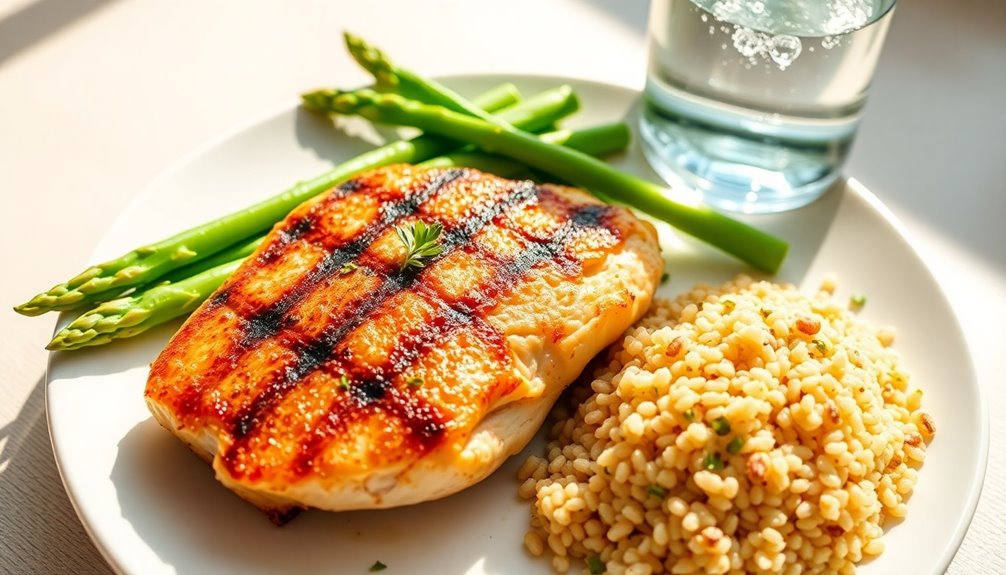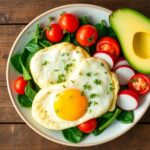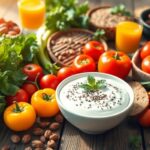A high-protein diet focuses on incorporating protein-rich foods, which are key for muscle growth and weight management. This approach can boost your metabolism, control appetite, and support overall health. You can find protein in lean meats, fish, dairy, legumes, and even supplements. To maximize your intake, try including protein in every meal, and opt for high-protein snacks. While it offers many benefits, it may also present challenges like digestive issues or cost concerns. By exploring how to navigate these hurdles, you can make the most of your diet and discover delicious recipes to try out.
Key Takeaways
- A high-protein diet focuses on consuming protein-rich foods to enhance muscle growth and support weight management.
- Key benefits include improved metabolism, appetite control, and better body composition.
- Common protein sources are lean meats, fish, dairy, legumes, and protein supplements.
- Meal planning is essential; incorporate protein into every meal and snack for optimal intake.
- Challenges may include digestive issues and cost, but recipes like Chickpea Salad and Greek Yogurt Parfait can help.
What Is a High-Protein Diet?
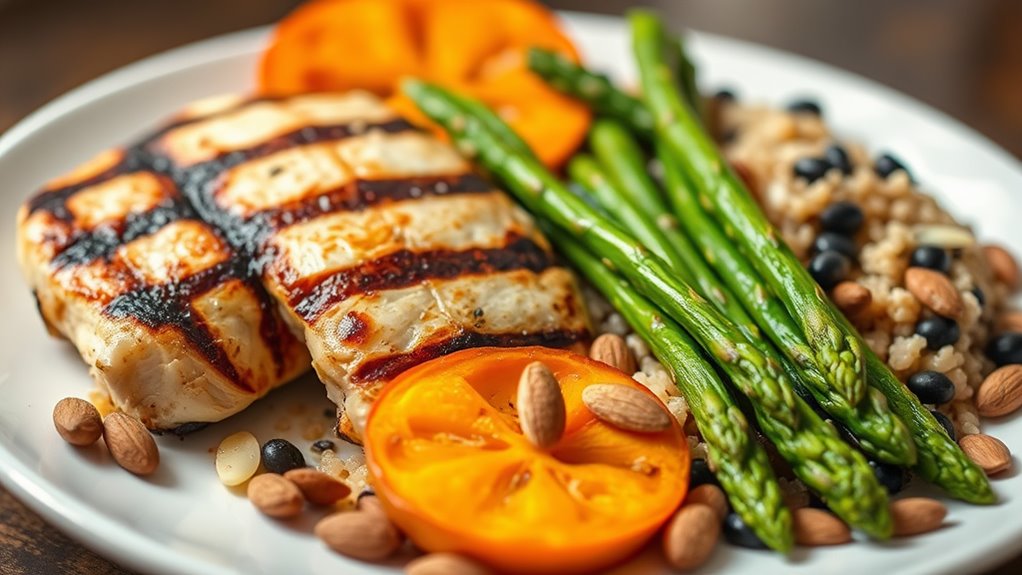
Eating a high-protein diet involves prioritizing protein-rich foods to support muscle growth, weight management, and overall health. You might wonder what exactly qualifies as a high-protein diet and how it can fit into your lifestyle. At its core, a high-protein diet focuses on incorporating more protein sources while balancing carbohydrates and fats.
This doesn't mean you have to give up your favorite foods; it's about making conscious choices that align with your protein requirements. Understanding protein importance is essential. It's not just about building muscle; protein plays a crucial role in repairing tissues, producing enzymes, and supporting immune function. When you consume adequate protein, you help your body perform optimally and feel more energized. It's a great feeling to know you're taking charge of your health in a way that fosters belonging in communities focused on fitness and wellness.
Your protein requirements may vary based on factors like age, weight, and activity level. Generally, aiming for about 20-30 grams of protein per meal can help you meet your daily needs, but it's vital to listen to your body. Additionally, incorporating whole-food sources of protein can enhance the nutritional quality of your meals.
You can include a diverse range of protein sources like:
- lean meats
- fish
- eggs
- dairy
- legumes
- nuts
Benefits of High-Protein Diets

A high-protein diet offers numerous benefits that can enhance your overall well-being and fitness voyage. When you include more protein into your meals, you're not just fueling your body; you're also setting yourself up for success in muscle building and weight loss. Protein helps you feel full longer, which can curb those cravings that often derail your progress.
Here's a quick look at some key benefits:
| Benefit | Description |
|---|---|
| Muscle Building | Protein is crucial for repairing and constructing muscle tissue, especially after workouts. |
| Weight Loss | Increased protein intake can help enhance metabolism and promote fat loss while preserving lean muscle. |
| Satiety | High-protein meals keep you satisfied, making it easier to resist unhealthy snacks. |
As you commence on this journey, remember that each meal is an opportunity to nourish your body and support your goals. By focusing on protein-rich foods, you're not just working towards a healthier you; you're joining a community of individuals who prioritize well-being and strength. You'll likely find that as you increase your protein intake, you'll gain energy and motivation, making it easier to stick to your fitness routine. Plus, sharing your experiences with others can foster a sense of belonging that enhances your motivation. Embrace the benefits of a high-protein diet, and watch as your body transforms along with your mindset. Additionally, incorporating effective exercise routines can further amplify your results and support your overall health journey.
Common Sources of Protein
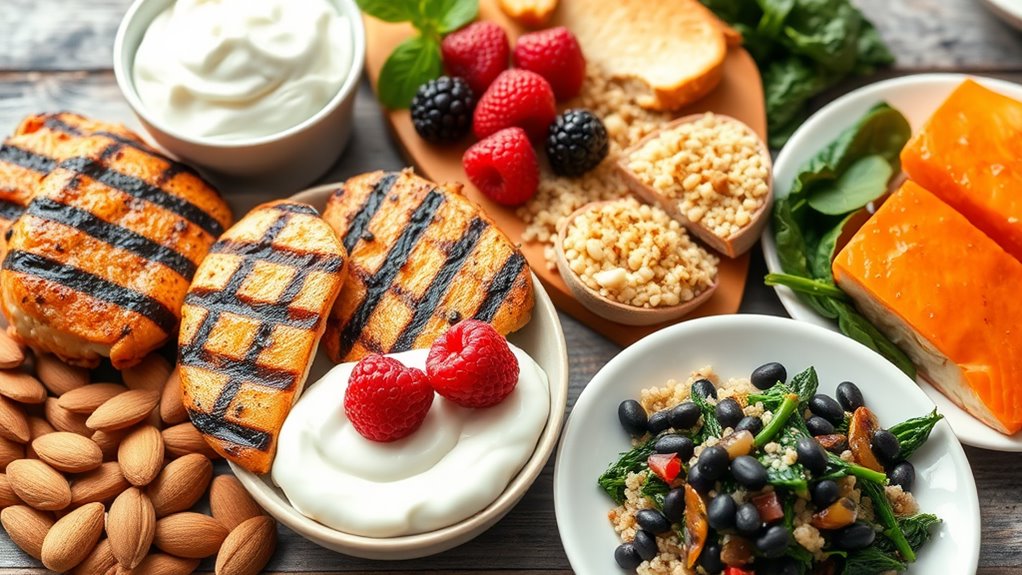
Protein comes from a variety of sources, making it easy to incorporate into any diet. Whether you're a meat lover, a vegetarian, or somewhere in between, you'll find plenty of delicious options to meet your protein needs. Here are some common sources you can include:
- Lean meats: Chicken, turkey, and lean cuts of beef are fantastic for boosting your intake.
- Fish and seafood: Salmon, tuna, and shrimp not only provide protein but also offer healthy fats.
- Dairy products: Greek yogurt, cottage cheese, and milk are great sources that also help with calcium intake.
- Legumes: Beans, lentils, and chickpeas are excellent vegetarian options packed with protein and fiber.
- Protein supplements: If you're on the go or need an extra boost, protein powders and bars can be convenient and effective.
You don't have to feel restricted in your choices. By mixing and matching these sources, you can create satisfying meals that keep you feeling full and energized. A plant-based diet can also provide rich sources of protein while promoting overall health.
If you're exploring vegetarian options, remember that combining different plant-based proteins can guarantee you obtain all essential amino acids. Everyone's journey towards a high-protein diet is unique, and finding what works for you is key.
With so many delicious sources available, you'll feel right at home in this protein-rich community!
Meal Planning for Protein Intake
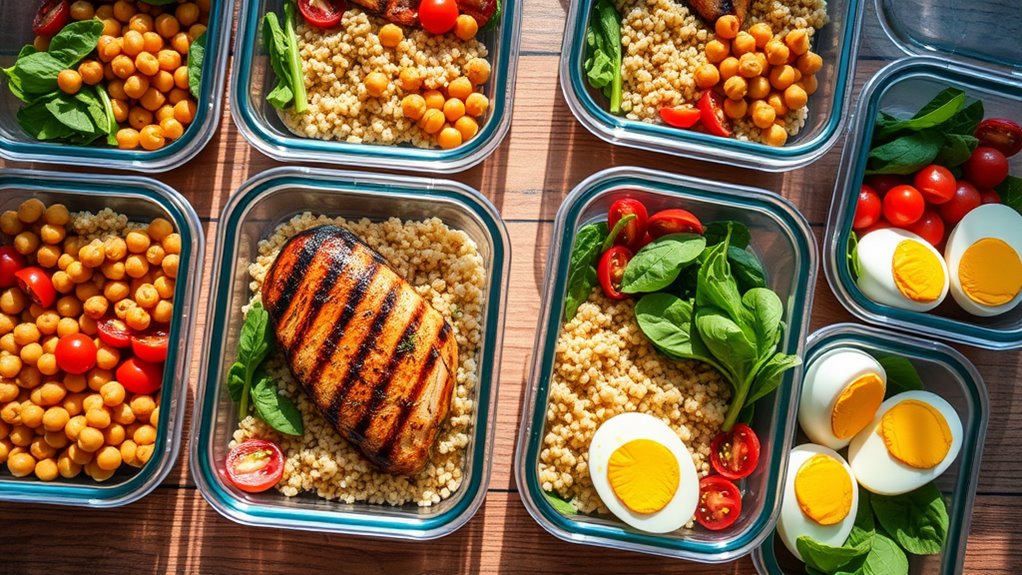
Planning your meals with a focus on protein can make a significant difference in meeting your dietary goals. It's all about creating a balanced and enjoyable menu that keeps you energized and satisfied throughout the day. Start by incorporating protein-packed breakfasts into your routine. Think about options like Greek yogurt with fruit, scrambled eggs with veggies, or oatmeal topped with nuts. These meals will set a positive tone for your day.
Next, consider your lunch and dinner choices. Aim for lean meats, legumes, or tofu, paired with whole grains and plenty of vegetables. This balance not only boosts your protein intake but also guarantees you're getting essential nutrients.
Don't forget to sprinkle in some protein-rich snacks throughout the day. Grab a handful of almonds, a hard-boiled egg, or a protein bar to keep your energy levels up and cravings at bay.
You might also want to prepare your meals in advance, making it easier to stick to your protein goals. Meal prepping allows you to control portion sizes and assures you always have a healthy option on hand. Plus, it's a great way to connect with friends or family who share similar goals—maybe even start a meal prep party! Additionally, incorporating smoothies that are high in protein can enhance your meal plans and contribute to rapid body fat elimination while still supporting your protein intake.
Tips for Increasing Protein
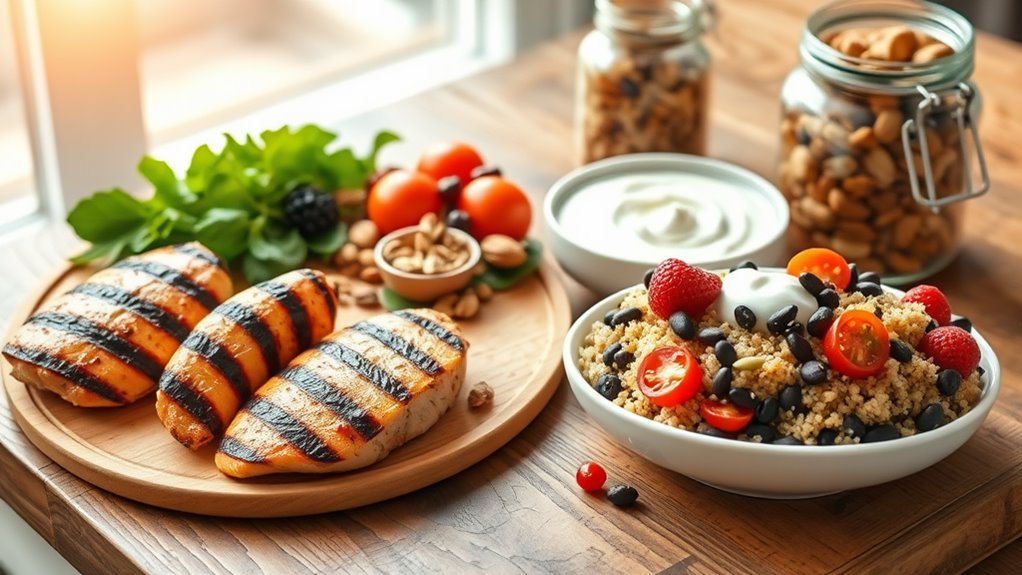
Boosting your protein intake can be simple with a few strategic changes to your diet. You don't have to overhaul your meals completely; just incorporate these tips to help you hit your protein goals while feeling satisfied and part of a community that values health and wellness.
- Start your day with protein: Opt for eggs, Greek yogurt, or a protein shake for breakfast. It sets a positive tone for the day.
- Snack wisely: Choose high-protein snacks like nuts, cheese, or protein bars instead of chips or sweets. This keeps you energized and connected with others who prioritize healthy choices.
- Explore protein supplements: If you're struggling to meet your protein needs through food alone, consider adding protein supplements to your routine. They're convenient and effective for many.
- Add legumes to your meals: Beans, lentils, and chickpeas are fantastic sources of protein. Toss them in salads, soups, or stir-fries to boost your intake without much effort.
- Incorporate protein shakes: These are a quick and tasty way to increase your protein intake, especially post-workout. You can customize them with fruits, veggies, or nut butter for added flavor and nutrition. Additionally, a healthy liver plays a crucial role in metabolizing protein, so maintaining liver health can further support your dietary goals.
Potential Challenges to Consider
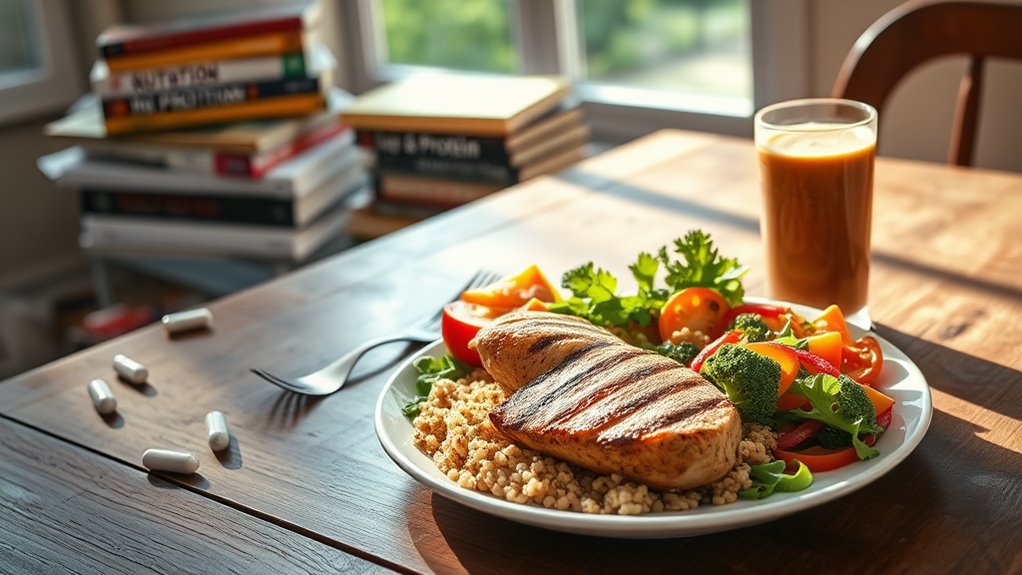
As you work on increasing your protein intake, recognizing that challenges can arise along the way is crucial. Maneuvering through a high-protein diet might not always be smooth sailing, but being mindful of potential hurdles can help you stay on track.
One common issue you might face is digestive problems. Increasing protein, particularly from animal sources, can lead to discomfort, constipation, or bloating for some individuals. It's vital to balance your diet with fiber-rich foods to alleviate these concerns. Additionally, be aware that consuming certain proteins may lead to inflammatory responses affecting your gut health.
Another obstacle worth considering is sustainability. While focusing on protein, you may find yourself heavily dependent on animal products, which can raise ethical and environmental questions. Many are pursuing a balance between personal health and the well-being of the planet.
Here's a quick visual representation of these challenges:
| Challenge | Description | Solution |
|---|---|---|
| Digestive issues | Increased protein can cause discomfort. | Incorporate fiber-rich foods into your diet. |
| Sustainability concerns | Heavy reliance on animal products. | Explore plant-based protein alternatives. |
| Cost of protein sources | Some protein sources can be expensive. | Opt for buying in bulk or selecting cost-effective options. |
| Meal planning | It can be challenging to plan high-protein meals. | Utilize meal prep strategies. |
| Social situations | High-protein diets can complicate dining out. | Communicate your dietary needs to friends. |
With these challenges in mind, you can approach your high-protein journey with confidence and clarity.
High-Protein Diet Recipes
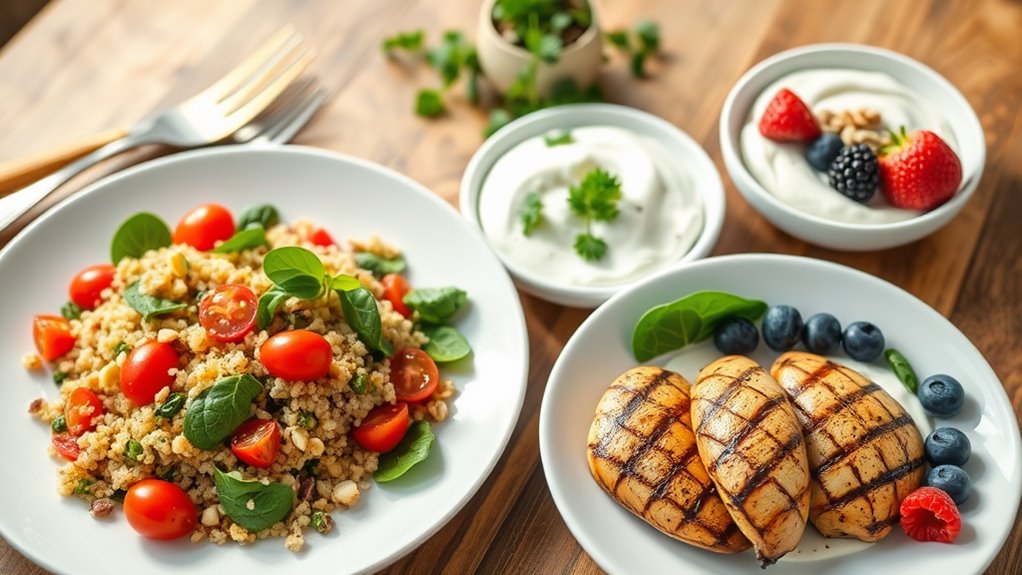
Elevate your meals with delicious high-protein recipes that not only satisfy your taste buds but also support your dietary goals. You don't have to sacrifice flavor for nutrition; in fact, these recipes will make you feel like a culinary superstar while keeping your protein intake on point. Whether you're cooking for yourself or sharing with friends, these meals are sure to impress.
Here are some quick protein meals and protein packed snacks to get you started:
- Chickpea Salad: Toss together chickpeas, cucumber, bell pepper, and a zesty dressing for a revitalizing, protein-rich dish.
- Greek Yogurt Parfait: Layer Greek yogurt with your favorite fruits and nuts for a creamy, satisfying snack.
- Egg Muffins: Whisk eggs with veggies and cheese, pour into muffin tins, and bake for a grab-and-go breakfast.
- Quinoa Stir-Fry: Sauté your choice of veggies with cooked quinoa and a dash of soy sauce for a hearty meal.
- Cottage Cheese Bowl: Top cottage cheese with fruits or savory ingredients like tomatoes and herbs for a versatile snack.
Incorporating these meals can complement the benefits of a ketogenic diet, which has shown potential advantages in managing appetite and supporting weight loss. These recipes aren't only nutritious but also easy to prepare, making them perfect for your busy lifestyle. By incorporating these high-protein options into your routine, you'll have meals that keep you energized and satisfied. So gather your ingredients, get cooking, and enjoy the delicious benefits of a high-protein diet!
Frequently Asked Questions
Can a High-Protein Diet Help With Weight Loss?
When you're exploring ways to shed those extra pounds, it's worth considering how macronutrient balance plays a role in your journey. Embracing varied protein sources can give you that satisfying feeling, keeping hunger at bay. This shift might help you feel lighter and more energized.
Are There Any Risks Associated With High-Protein Diets?
Yes, there are some risks linked to high-protein diets. You might experience issues with kidney health, particularly if you already have underlying conditions. Additionally, focusing heavily on protein can result in nutrient deficiencies, as you may not consume adequate amounts of fruits, vegetables, and whole grains.
It's vital to balance your meals to make sure you're nourishing your body properly. Staying informed and mindful can assist you in making the best choices for your health journey.
How Does Protein Intake Affect Muscle Gain?
When you increase your protein intake, you boost protein synthesis, which is vital for building muscle. This process helps your muscles recover after workouts, allowing you to push yourself harder next time.
Can Vegetarians Follow a High-Protein Diet Effectively?
Absolutely, you can follow a high-protein diet as a vegetarian! By focusing on plant-based sources like beans, lentils, quinoa, and tofu, you're already on the right path.
Don't forget about protein supplements like pea or hemp protein for an extra boost. Balancing these foods guarantees you get enough protein while enjoying delicious meals.
You'll find a supportive community of fellow vegetarians who share tips and recipes, helping you thrive on your journey!
Is It Safe for Children to Consume High Protein?
It's crucial to make sure that your child's diet supports their growth and development. While protein is crucial, balance is key. Too much protein can overshadow other essential nutrients, so you'll want to provide a variety of foods.
Focus on a nutrient balance that includes fruits, vegetables, and whole grains alongside protein sources. This way, you'll help your child thrive and feel their best, fostering a sense of belonging in their healthy eating journey.
Conclusion
Incorporating a high-protein diet can transform your health and fitness journey. Did you know that studies show people on high-protein diets tend to feel fuller longer, leading to a 50% reduction in snacking? With so many delicious protein sources and easy meal planning tips, you can easily boost your intake. Remember, it's important to find a balance that works for you. So, why not start today and see how a little extra protein can make a big difference?

